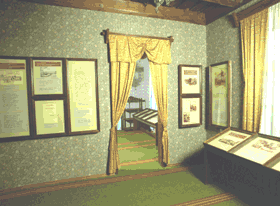| | Alexander Pushkin
(1799-1837)

The exposition acquaints visitors with main phases of the poet‘s life and creative work. | | | 1799-1811. Childhood | Alexander Pushkin was born on 6 June, 1799 in Moscow.
His father Sergey Lvovich Pushkin, a retired major, descended from an old, once wealthy and belonging to the gentry family, and his mother was a granddaughter of „the Nigro of Peter the Great“ (later – the Russian general Hanibal). The father and mother, carried away by high society‘s life, paid little attention to their children, only three of which grew un: the eldest daughter Olga and the sons Alexander and Leo. The other children died in childhood. Their upbringing was committed to foreign tutors that often changed one another and left in A. Pushkin unpleasant memories. His best friend in childhood was his nanny Arina Rodionova, an illiterate serf peasant woman, who breathed liking for folk poetry into her pupil with her songs and tales.
| |
| | | 1811-1817. Years at the Lyceum | | | A. Pushkin entered the Lyceum on 19 October, 1811. Years spent there formed the poet‘s world outlook and political convictions. A. Pushkin‘s lyric poetry of the Lyceum years is full with joy of life. The poet wrote 130 poems while in the Lyceum. According to V.Bielinsky, “it was clear in the Lyceum already that A. Pushkin becomes a poet of nation-wide fame”. At the beginning of June, 1817, final examinations of pupils of the Lyceum took place. After finishing the Lyceum, Pushkin was taken into service at the Collegium of Foreign Affairs. The independent poet‘s life began.
|
| | | 1817-1820. Petersburg period | | | Life in Petersburg was not only time of cheerful and careless life, but a period of intense spiritual growth as well. Young A. Pushkin was expressing himself as a spreader of liberal and patriotic state of public opinion, in which progressive young people of the nobility were living. At the end of 1817, Pushkin creates his famous “Ode to Liberty”. Pushkin‘s name was getting increasingly famous, a public audience was taking an interest in his works, and especially popular were his political poems. Displeased Alexander I decided to exile him to Siberia. Only Karamzin and Zhukovsky‘s protection saves the poet from the more cruel punishment: Pushkin is banished to the South. Officially this deportation was registered as “an official transfer”.
|
| | | | | | | 1820-1822. Exile in the South | | | A. Puskin‘s years in the South were not only diverse and marked with cheerful life, but also was a period of intense creative work, years of deep reflections. There a romantic elegy “The day‘s luminary went out..’’ poems “The Prisoner of the Caucasus“, and “The Fountain of Bakchisarai” were written.
|
| | | | | | | 1824-1825. Exile in Michailovskoje | | | He spent two years there, reading and creating a lot, listening to his former nanny Arina Rodionovna‘s tales in the evenings. Here, varying his lonely life by visiting his neighbour land-owning lady Osipova, he met Ana Kern at her home. In Michailovskoje, the poet got acquainted with serf peasants‘ life. Here, he created the poem „The Gipsies“, his last work of a purely romantic nature. Historical themes were drawing his attention, especially periods of social upheavals and historical crises. In Michailovskoje village, he in great inspiration created the historical drama ,,Boris Godunov”, was continuing his work on the novel ,,Eugeny Onegin”..
|
| | | | | | | 18Marriage to Natalie Goncharova | | | On 18 February, 1831, A. Pushkin married Natalie Goncharova. The marriage was for him both the source of happiness and the cause of his death. ,,I am - married, I am happy, - the poet was writing. – My only thirst is that nothing in my life would change: I shall not expect for anything better.” After the marriage, Pushkin and his wife moved to Petersburg. The tsar granted to him the title of a gentleman of the monarch's bed-chamber. Presenting the poet with a court title, usually given only to youths, the tsar hoped not only to humiliate Pushkin, but to undermine his social influence as well. Beside that, the tsar Nikolaj I wished to see the poet‘s wife, whom he had taken the fancy of, in his palace. The poet‘s creative work could not be intensive in such circumstances. His financial affairs were getting continually worse. Living in grand style was requiring large expenses. The family was growing. Children Maria, Alexander, Grigory and Natalie were born. Two his wife’s sisters were living together with A. Pushkin‘s family. The poet was gradually sticking in debts not only to private persons but also to the government: the tsar, lending money to Pushkin, hoped to subjugate the poet and to tie him to the palace. |
| | | | | | Since the year 1836, Petersburg‘s aristocratic society entangled A. Puchkin and his wife in disgustful intrigues and slander. Dantes, an officer, French emigrant, world vagabond, who persistently courted Pushkin‘s wife, was involved in that intrigues. The situation got unbearable and on 27 January 1837, Dantes and Pushkin had a duel, in which the poet was lethally wounded. On 29 January 1837, after terrible suffering, the poet died in his apartment at Moika str. 12 in Petersburg. On 6 February 1837, A. Pushkin was burried next to his mother in the cemetry of the Sviatogorsk Monastery. |
|
| |
|
